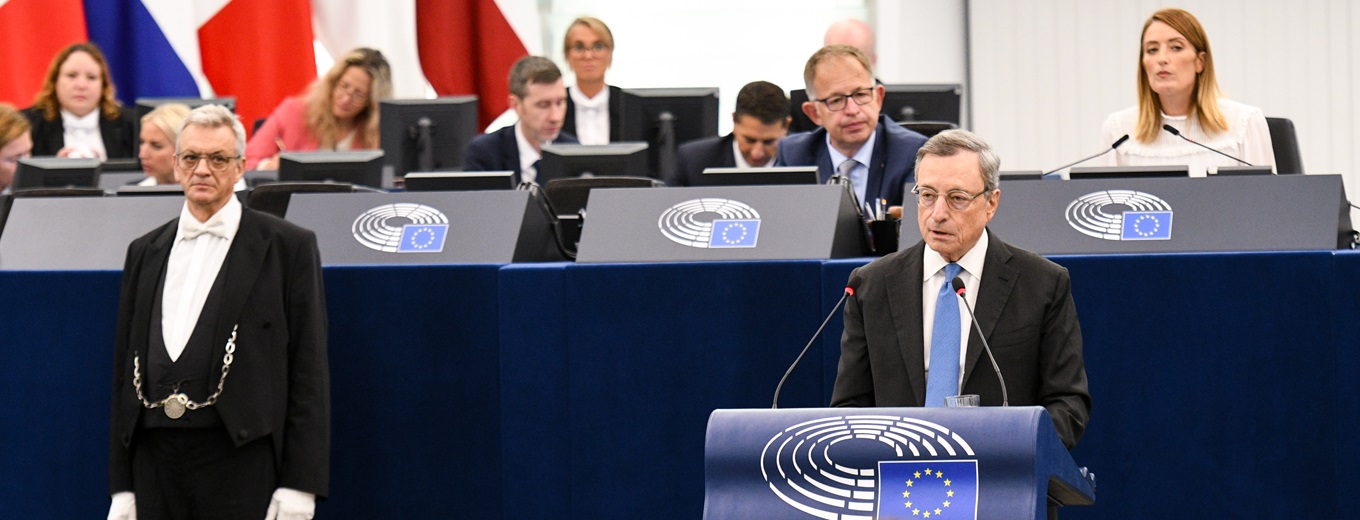Massive investments and end of stovepipes: The discussions on the future of the EU kicked off with the much anticipated Competitiveness report and the structure of the new EC.
This month saw two much anticipated announcements in the EU sphere: On 9 September 2024, the former Italian Prime Minister and ECB President, Mario Draghi, presented his flagship report on the future of European competitiveness. And on 17 September 2024, re-elected European Commission President Ursula von der Leyen unveiled her plans for the new College of Commissioners, including the organisational chart and portfolio distribution.
The report on competitiveness (‘Draghi report’) introduces a new industrial strategy for the EU in the context of Europe’s falling competitiveness, specifically in reduced productivity compared to the US and China. The three main fields of action identified by Draghi to dramatically increase Europe’s competitiveness are: i. closing the innovation gap, ii. decarbonise and lower energy prices, iii. increase security and reduce dependencies. In many of these challenges, such as decarbonisation or reducing dependencies, innovation and new technologies play a key role. In this regard, education, research and innovation are key fields directly related to Europe’s competitiveness. The Draghi report, therefore, includes analyses and concrete suggestions for the future of the education, research and innovation framework programmes and policies.
Draghi states that the level of private and public funding for research and innovation, including through Horizon Europe, is not sufficient, and especially difficult to access for newcomers to the programme. Draghi recommends allocating more funding to disruptive innovation by reforming the EIC to become a ‘genuine ARPA-type agency’ with experienced and powerful programme managers and maximising access for young innovative start-ups. Nevertheless, he underlines the value of fundamental, ground-breaking research and calls for a doubling of the ERC budget. Moreover, he introduces new ideas, such as extending the ERC with a new instrument for excellent institutions (ERC-I) to “propel them to the very top of academic excellence globally”. This ERC-I should fund research units, such as labs or departments on a competitive basis. Furthermore, Draghi also proposes a new scheme to attract and retain world-class researchers called the EU Chair. An EU Chair position would come with a globally competitive salary and an official EU title. In order to improve productivity and innovation capacity, existing skills shortages need to be addressed. Draghi therefore calls for a European Strategy to address skills gaps to be more responsive to technological changes. Under the framework of a new ‘Union of Skills’, efforts of the EU and Members States should be pooled and the Erasmus+ programme strengthened.
While some of the report’s ideas have found their way into the political guidelines for the next five years (see SwissCore article) and the mission letters of the new Commissioners-designate, the publication of the report was also met with criticism. On the one hand, Member States are not enthusiastic about Draghi’s call for €800 billion in additional annual investments, partially through new EU common debt. On the other hand, economists such as Daniel Gros from Bocconi University come to the conclusion that the investment gap between the US and EU is only present in private R&D investments (1,2% in the EU versus 2,3% in the US) and that the major differences in productivity are mostly relevant in the ICT and software sector. According to Daniel Gros, strengthening the EU’s presence in new ICT markets would require reforms in the venture capital rules and a reduction of EU reporting duties to stop start-ups from moving out of the EU instead of massive public investments.
Later in the month, on 17 September 2024, President von der Leyen presented her new College of Commissioners 2024-2029. The new organisational structure is led by the President and six Executive Vice-Presidents (EVP). While there is significant overlap between the responsibilities (the end of “rigid stovepipes”) of the different Commissioners-designate, the relevant names for education, research and innovation are Roxana Mînzatu (Romania/S&D) as Executive Vice-President for People, Skills and Preparedness and Ekaterina Zaharieva (Bulgaria/EPP) as Commissioner for Startups, Innovation and Research. They will be responsible for DG EAC & DG EMPL and DG RTD & JRC respectively, which represents a change to the current structure, in which one Commissioner is responsible for education, research and innovation overall. Roxana Mînzatu’s mission letter focuses strongly on the proposed “Union of Skills” and tackling skills shortages. Ekaterina Zaharieva’s mission letter specifically mentions the “work to expand the EIC and ERC and to further simplify access to funding, especially for innovative SMEs and small midcaps”, for example, by creating a European Innovation Act to facilitate access of start-ups to EU funding and markets. Furthermore, she will propose a “European Research Area Act to guarantee a fifth freedom”. All the Commissioners-designate will be invited to hearings in the European Parliament which will then vote on them in the coming two months. The expected starting date of the new Commission is likely to be 1 December 2024.

